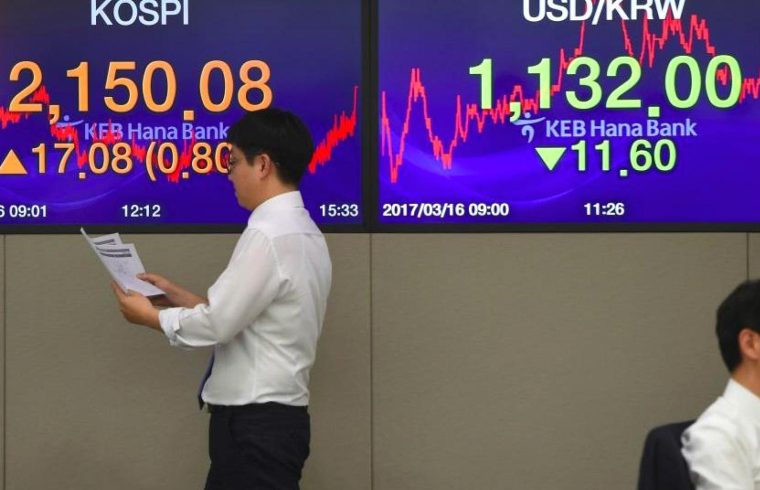
Markets in Asia trended flat on Monday after the latest ballistic missile test by North Korea and as major markets are closed for public holidays today.
North Korea fired what looked to be a ballistic missile near its coast. The missile reportedly landed in the Sea of Japan after staying in the air for 6 minutes. This is the ninth missile the hermit state has tested this year, as it faces increasing pressure from the U.S. and historical ally China over its missile testing program.
Markets in Asia largely shrugged off the news. Japan’s benchmark Nikkei 225 index closed effectively flat, down 0.02 percent or 4.27 points at 19,682.57. South Korea’s Kospi shed 0.1 percent or 2.33 points to close at 2,352.97 after six straight sessions of gains.
The S&P/ASX 200 declined after trading flat earlier in the session, to close lower by 0.77 percent or 44.564 points at 5,707.1. The fall was driven by its financials sub-index, which tumbled 1.41 percent.
Hong Kong’s Hang Seng Index was higher by 0.16 percent at 2:45 p.m. HK/SIN.
Markets in mainland China are closed for a public holiday today.
Stateside, Wall Street will be closed for Memorial Day, after closing mixed last Friday following the release of the second reading of Q1 GDP numbers. Markets in the U.K. will also be closed for the spring bank holiday.
With several large markets closed today, trading was expected to be subdued, CMC Markets Chief Market Strategist Michael McCarthy said in a note on Monday morning.
“Investors and traders may hold out for important reads on the world’s largest economies this week,” McCarthy said, highlighting PMI data from China, retail sales and industrial production in Japan, and a deluge of U.S. data due later in the week.
Japanese electronics company Sharp said last Friday it was estimating a profit of 59 billion yen ($ 530 million) for the year ended March. This will be the company’s first profit in four years. Sharp shares ended trade flat, at 415 yen a stock.
Shares of Softbank Group were closed 1.85 percent lower at 8,732 yen a stock on Monday, despite a note from Nomura last Friday that raised its target price of the Japanese telecommunications company from 11,550 yen to 11,280 yen a stock. Nomura Research Analyst Daisaku Masuno maintained his “Buy” call on the stock.
“We like Softbank Group as a company working to spur technological advances on a global basis, as seen with ARM and the Softbank Vision Fund, and to then benefit from those advances,” Masuno wrote.
Oil prices reversed earlier gains to trade lower. This followed OPEC’s decision to extend output cuts last week and growth in U.S. drilling. Brent crude futures shed 0.13 percent to trade at $ 52.08 a barrel and U.S. crude futures were down 0.18 percent at $ 49.71 at 2:20 p.m. HK/SIN.
In currency news, the dollar gained slightly against a basket of six rival currencies after reaching a near six-and-a-half month low last week. The dollar last traded at 97.442.
“(T)he dollar has essentially traded sideways over the past few days, still reflecting a bit of softness from U.S. political uncertainty although on Friday, it benefited from … weakness (in the British pound),” said National Australia Bank Currency Strategist Rodrigo Catril.
The greenback was flat against the yen to trade, with the dollar fetching 111.33 yen compared to the 111.5 handle seen last week. Meanwhile, the Australian dollar weakened against the dollar to trade at $ 0.7428.
Pound sterling, which fell last Friday following a poll reflecting U.K. Prime Minister Theresa May’s lead had diminished ahead of a snap election, recovered slightly to trade at $ 1.2827. This was still well off levels around the $ 1.29 handle seen last week.
Despite short term uncertainty, the pound still had room to strengthen in the long run, UBS Wealth Management Head of Commodity and APAC Foreign Exchange Dominic Schneider told CNBC’s “Squawk Box,” citing the fair value of the cable. May was also likely to be re-elected, he added.



